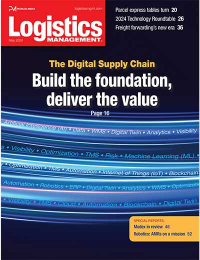Signs of progress appear to be made on PMA-ILWU negotiations

Late last week, signs of progress were made in the ongoing labor negotiations between the International Longshore and Warehouse Union (ILWU) and the Pacific Maritime Association (PMA).
The ILWU represents port workers in California, Oregon, and Washington, with more than 30% of U.S. incoming container traffic moving through West Coast ports at the Ports of Los Angeles and Long Beach, according to industry estimates. The PMA represents shipping lines and terminal operators at 29 West Coast ports. And the contract, which expired on July 1, represents more than 22,000 dockworkers at all 30 U.S. West Coast ports.
On April 20, the ILWU said that it has reached a tentative agreement with the PMA “on certain key issues,” adding that talks are continuing on an ongoing basis until an agreement is reached.
“The union and the employer previously announced on July 26, 2022 that they had reached a tentative agreement on terms for maintenance of health benefits,” said ILWU in a statement. “The parties also issued a joint press release on February 23, 2023 announcing that they continue to negotiate and remain hopeful of reaching a deal soon. The parties have agreed not to discuss the terms of the tentative agreements as negotiations continue.”
On the same day, the PMA said that while significant progress has been achieved in coastwise contract negotiations, several key issues remain unresolved.
“Meanwhile, work actions led by ILWU Local 13 at the Ports of Los Angeles and Long Beach continued to disrupt some operations at key marine terminals [on April 20],” said PMA officials. “The Union is deliberately conducting inspections that are not routine, unscheduled, and done in a way that disrupt terminal operations.”
While neither ILWU or PMA declined to offer up specifics of the tentative agreement, a Wall Street Journal report, citing sources familiar with the negotiations, said it was related to automated machinery at cargo terminals. The report added that the agreement “covered terms over the use of automation, one of the biggest stumbling blocks in negotiations…leaving wages as one of the main dividing points in reaching a new multiyear agreement.”
Earlier this month, on Thursday, April 6, at 5:00 pm Pacific Standard Time, ILWU Local 13 crane operators and top handler drivers decided to reject their job assignments that were ordered by the employers for the evening’s second shift, impacting all Los Angeles and Long Beach terminals,” stated a customer advisory issued by Copenhagen, Denmark-based A.P. Moeller Maersk, an integrated container logistics services provider. “As a result, no operations were performed on the night shift. Every terminal in the harbor canceled all vessel, yard, rail and gate operations for the night shift with the uncertainty of not knowing if they would be able to resume for Friday's 1st shift.”
POLB officials said that four of its container terminals were closed for the entire day on Friday, April 7, with terminal operations shut down after workers did not report for work. And a POLB statement noted it was working with stakeholders, including federal officials, to “support a return to normal operations in the San Pedro Bay” prior to returning back to work on Saturday, April 8.Going back to the middle of 2022, West Coast ports have lost market share, due to the uncertainty of the timing of a new deal being reached, to East Coast and Gulf Coast ports, with shippers not wanting to have labor issues impact cargo flows.
Not long after the July 1, 2022 expiration of their current contract, PMA and ILWU said they came to terms on a tentative agreement on terms for health benefits, adding that the tentative agreement is subject to agrement on the other issues in the negotiations.
“The parties have agreed not to discuss the terms of this tentative agreement as negotiations continue,” said ILWU and PMA officials in a statement. “Maintenance of health benefits (MOB) is an important part of the contract being negotiated between employers represented by the PMA and workers represented by the ILWU.”
Late last month, a group of national industry associations, largely representing shippers and freight transportation and logistics services providers, called on President Biden, in a letter, to take action, regarding the still-unresolved West Coast port labor negotiations between the PMA and ILWU.
“The labor contract has now been expired for over eight months,” the letter stated. “Negotiations have been ongoing for over ten months, with little to no progress towards a new long-term agreement. It is imperative that the administration work with the parties to quickly reach a new agreement and ensure there is no disruption to port operations and cargo fluidity.”
The letter’s authors added that it is encouraging the White House to offer mediation services to the parties in their negotiations in order to alleviate the current situation, explaining that the lack of labor certainty has led to significant cargo flows shifting away from the West Coast. And they observed that while there are other issues impacting West Coast ports, supply chain stakeholders, or “cargo interests,” have indicated they have shifted cargo, due to the stalled negotiations.
“That cargo will not return to the West Coast until after a contract is final and approved by both parties,” the letter noted. “The longer there is no ratified contract only increases the probability that some portion of the freight will never return to the West Coast ports. Businesses have already made their shipping decisions for the all-important peak shipping season, which will begin this summer. Even though cargo volumes have dropped, we continue to experience supply chain stress and challenges. While many continue to recover from pandemic related issues, the ongoing stress of inflation and economic uncertainty continues to impact supply chain stakeholders as well.”
As previously noted in LM, this is not the first time a contract between the organizations gone on following the end of an existing contract. And one does not have to go too far back to see how acrimonious negotiations were, as in 2015, in the months prior to the June 30 deadline, it required the U.S. Federal Mediation and Conciliation Service to step in to help the sides find a way to come to an agreement over stalled labor negotiations. What’s more, the ongoing tension between the parties subsequently resulted in hindered productivity and also was a contributing factor in port congestion on the West Coast, especially as it led up to the 2016 holiday season.
The PMA said, at the time, that the state of terminal productivity at the five largest West Coast ports was approaching gridlock, due in large part to what it labeled ILWU-staged shutdowns.

Article Topics
3PL News & Resources
April Services PMI contracts after 15 months of growth, reports ISM 2023 industrial big-box leasing activity heads down but remains on a steady path, notes CBRE report Q1 U.S. Bank Freight Payment Index sees shipment and spending declines Ryder opens up El Paso-based multi-client facility logistics facility April manufacturing output takes a step back after growing in March TIA rolls out updated version of framework focused on fighting freight fraud National diesel average is down for the third consecutive week, reports EIA More 3PLLatest in Logistics
April Services PMI contracts after 15 months of growth, reports ISM 2023 industrial big-box leasing activity heads down but remains on a steady path, notes CBRE report U.S. rail carload and intermodal volumes are mixed in April, reports AAR Q1 U.S. Bank Freight Payment Index sees shipment and spending declines S&P Global Market Intelligence’s Rogers assesses 2024 import landscape Pitt Ohio exec warns Congress to go slow on truck electrification mandates Q1 intermodal volumes are up for second straight quarter, reports IANA More LogisticsAbout the Author
Subscribe to Logistics Management Magazine

Find out what the world's most innovative companies are doing to improve productivity in their plants and distribution centers.
Start your FREE subscription today.
May 2024 Logistics Management

Latest Resources














